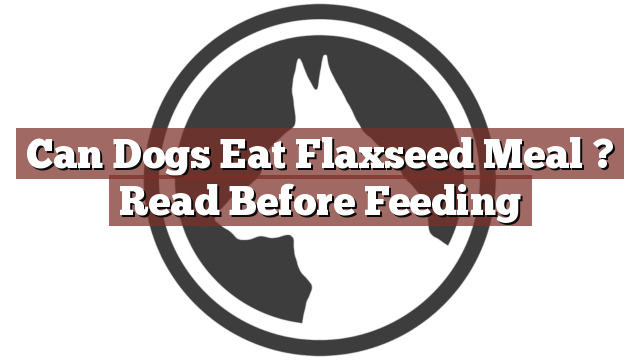Understanding Your Dog’s Dietary Needs
As pet owners, it is essential to understand the dietary requirements of our furry friends. Dogs have specific nutritional needs that differ from humans, including a diet rich in protein, healthy fats, and vitamins. While it’s tempting to share our food with our dogs, it’s crucial to be aware of what is safe for them to consume. Feeding them an improper diet can lead to health issues, such as obesity, digestive problems, or even toxicity. Therefore, it is important to research and consult with a veterinarian before introducing new foods into our dog’s diet.
Can Dogs Eat Flaxseed Meal? Read Before Feeding
Flaxseed meal has gained popularity among health-conscious humans due to its numerous health benefits. It is a rich source of omega-3 fatty acids, fiber, and lignans, which can promote cardiovascular health and aid in digestion. However, when it comes to feeding flaxseed meal to dogs, it is crucial to exercise caution.
Yes, dogs can eat flaxseed meal, but it is essential to do so in moderation and under the guidance of a veterinarian. Flaxseed meal can provide certain health benefits for dogs, such as promoting a healthy coat and supporting a strong immune system. However, it should not be the sole source of essential nutrients in their diet.
Pros and Cons of Feeding Flaxseed Meal to Dogs
Pros:
- Omega-3 Fatty Acids: Flaxseed meal is a great source of omega-3 fatty acids, which can promote healthy skin, a shiny coat, and reduce inflammation in dogs.
- Fiber: Flaxseed meal contains a good amount of dietary fiber, which can aid in digestion and promote regular bowel movements.
- Lignans: Lignans found in flaxseed meal have antioxidant properties and may help to reduce the risk of certain diseases in dogs, similar to humans.
Cons:
- Digestive Issues: Some dogs may have difficulty digesting flaxseed meal, leading to gastrointestinal problems such as diarrhea or upset stomach.
- High-Calorie Content: Flaxseed meal is calorie-dense, so it should be fed in moderation to prevent weight gain or obesity in dogs.
- Potential Allergies: Just like with any new food, some dogs may develop allergic reactions to flaxseed meal. It is important to monitor your dog for any signs of allergies, such as itching, vomiting, or diarrhea.
Conclusion: Weighing the Benefits and Risks of Flaxseed Meal for Dogs
In conclusion, dogs can eat flaxseed meal in moderation as part of a balanced diet. It can provide certain health benefits, including omega-3 fatty acids, fiber, and lignans. However, it is crucial to consult with a veterinarian before introducing flaxseed meal into your dog’s diet, as individual dietary needs may vary.
If your dog has a pre-existing health condition, is on medication, or has a history of allergies, it is especially important to seek professional advice. Remember that a dog’s diet should primarily consist of high-quality dog food that meets their nutritional requirements. Adding flaxseed meal should only be done under the guidance of a veterinarian to ensure your dog’s overall health and well-being.
Thank you for taking the time to read through our exploration of [page_title]. As every dog lover knows, our furry friends have unique dietary needs and responses, often varying from one canine to another. This is why it's paramount to approach any changes in their diet with caution and knowledge.
Before introducing any new treats or making alterations to your dog's diet based on our insights, it's crucial to consult with a veterinarian about [page_title]. Their expertise ensures that the choices you make are well-suited to your particular pet's health and well-being.
Even seemingly harmless foods can sometimes lead to allergic reactions or digestive issues, which is why monitoring your dog after introducing any new food item is essential.
The content provided here on [page_title] is crafted with care, thorough research, and a genuine love for dogs. Nevertheless, it serves as a general guideline and should not be considered a substitute for professional veterinary advice.
Always prioritize the expert insights of your veterinarian, and remember that the health and happiness of your furry companion come first.
May your journey with your pet continue to be filled with joy, love, and safe culinary adventures. Happy reading, and even happier snacking for your canine friend!

